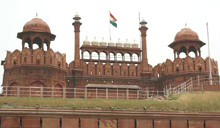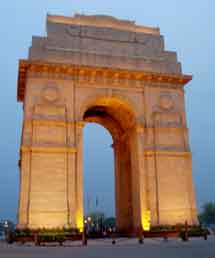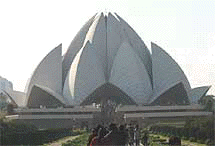 Rashtrapati
Bhawan Rashtrapati
Bhawan
Modern New Delhi, or New Delhi as it
is called, centers around the Rashtrapati Bhawan. It is
architecturally a very impressive building standing at a height,
flowing down as it were to India Gate. This stretch called the
Rajpath is where the Republic Day parade is held. The imposing plan
of this area conceived by Lutyens does not fade in its charm with
the numerous summers or winters that go past.
National
Science Centre Museum
Located near Gate No.1, Pragati
Maidan, Near Gate No. 1, New Delhi, this museum is one of the
largest and best science centers of National Council of Science
Museum (NCSM) with good scientific models, participatory exhibits,
and interesting artifacts on display, with the aim to rouse
children's interest in Science. The museum has working science
exhibitions as well as exhibits on the history of architecture. Open
11.30 am – 7 PM Entry free. Mondays closed.
NEHRU MUSEUM
& PLANETORIUM
Location:
Teen Murti Bhavan, Teen Murti Marg, New Delhi
Spl. School Programmes:
9:30 am to 10:30 pm.
Additional shows on Sundays and holidays in Hindi- 10:30 am to 3:00
pm.
Hindi Shows- 10 am to 5 pm.
The residence of Late Jawaharlal
Nehru, the first Prime Minister of India was converted into a museum
after his death. The museum is a fascinating place to learn about
the history of the Independence Movement.
There are several photographs of the erstwhile Prime Minister,
giving an account of his life. Besides this, the colonial building
is also equally interesting, with its teak paneled rooms with high
ceilings, spacious verandas and well kept gardens.
Established on 6th February 1984 to promote space education and
astronomy among the common people, especially the youth, the
planetarium has a good sky theatre accommodating 270 viewers. It
screens taped and live public shows on various cosmic topics like
cosmic heritage, the solar system or history of a particular star.
National Museum
This museum possesses over 2,00,000 works of exquisite art, both of
Indian and Foreign origin covering more than 5,000 years of our
cultural heritage. Apart from the collections of Pre-historic
Archaeology, Archaeology, Jewelry, Paintings, Decorative arts,
Manuscripts, Central Asian Antiquities, Arms and Armor, etc, the
museum has separate branches of publication, Hindi, Public
Relations, Education, Library, Exhibition cell, Display, Modeling,
Photography, Security and Administration.
National Gallery of Modern Art Located
in Jaipur House, the gallery near India Gate at the eastern end of
Rajpath, was the former residence of the Maharaja of Jaipur . This museum was inaugurated on
29th March, 1954. The erstwhile residential palace of the Maharaja
of Jaipur, the museum exhibits around 4,000 paintings, graphics, and
sculptures of modern artists. It
houses an excellent collection of works by both Indian and colonial
artists. It is open daily from 10 am to 5 PM; admission is free
The Rail Museum
Its vintage displays include the oldest locomotive in the
world-still working; the Viceregal Dining Car (1889) and the Prince
of Wales Saloon (1875), Maharaja of Mysore's Saloon (1899), Maharaja
of Baroda's Saloon (1886). The royal saloons are definitely worth a
look for the elaborate interior design.
 Jantar mantar
The various abstract structures within the Jantar Mantar
are, in fact, instruments thatwere used for keeping track of
celestial bodies. Yet, Jantar Mantar is not only a timekeeper of
celestial bodies, it also tells
a lot about the technological achievements under the Rajput kings and their attempt to resolve the
mysteries regarding astronomy. Jantar mantar
The various abstract structures within the Jantar Mantar
are, in fact, instruments thatwere used for keeping track of
celestial bodies. Yet, Jantar Mantar is not only a timekeeper of
celestial bodies, it also tells
a lot about the technological achievements under the Rajput kings and their attempt to resolve the
mysteries regarding astronomy.
 Red
Fort In Old Delhi, you may visit the
ramparts of the Red Fort. The decision for constructing the fort was
taken in 1639, when Shahjahan decided to shift his capital to New
Delhi from Agra. Within eight years, Shahjahanabad was completed
with the Red Fort-Qila-i-Mubarak (fortunate citadel)-New Delhi's
seventh fort, ready in all its magnificence to receive the Emperor.
The Red Fort still retains some of its lost glory. The Red Fort was
the last fort built in New Delhi and it witnessed the vicissitudes
of fortune, the splendour and the fall of the Mughals, British rule,
and finally the dawn of Indian Independence. A place must see by all
tourists visiting Delhi. Red
Fort In Old Delhi, you may visit the
ramparts of the Red Fort. The decision for constructing the fort was
taken in 1639, when Shahjahan decided to shift his capital to New
Delhi from Agra. Within eight years, Shahjahanabad was completed
with the Red Fort-Qila-i-Mubarak (fortunate citadel)-New Delhi's
seventh fort, ready in all its magnificence to receive the Emperor.
The Red Fort still retains some of its lost glory. The Red Fort was
the last fort built in New Delhi and it witnessed the vicissitudes
of fortune, the splendour and the fall of the Mughals, British rule,
and finally the dawn of Indian Independence. A place must see by all
tourists visiting Delhi.
 Qutab
Minar The Qutab Minar is located at a small
village called Mehrauli Qutab
Minar The Qutab Minar is located at a small
village called Mehrauli
in South New Delhi. Qutub-ud-din Aibek of
the Slave Dynasty, who took possession of New Delhi in 1206, built
it. It is a fluted red sandstone
tower, which tapers up to a height
of 72.5 metres and is covered with
intricate carvings and verses
from the holy Qur'an.
The landmark of New Delhi is a place to see.
India Gate  A
memorial inscribed with the names of the valiant Indian soldiers who
laid down their lives in World War
I. The green, velvety lawns at India Gate, particularly, are a
popular evening and holiday rendezvous for young and old alike. A
must visit place in New Delhi. A
memorial inscribed with the names of the valiant Indian soldiers who
laid down their lives in World War
I. The green, velvety lawns at India Gate, particularly, are a
popular evening and holiday rendezvous for young and old alike. A
must visit place in New Delhi.
Raj Ghat Raj Ghat On the bank of the legendary
Yamuna, which flows past New Delhi, there is Raj Ghat-the last
resting place of Mahatma Gandhi, the father of the nation. It has
become an essential point of call for all visiting dignitaries.
Besides Raj Ghat the other near by places must see in New Delhi are
the two museums dedicated to Gandhi.
 Lotus Temple
The Bahai Temple, situated in South
New Delhi, is shaped like a lotus. It is an eye-catching edifice
worth exploring. Built by the Baha'i community, it offers the
visitor a serenity that pervades the temple and its artistic design Lotus Temple
The Bahai Temple, situated in South
New Delhi, is shaped like a lotus. It is an eye-catching edifice
worth exploring. Built by the Baha'i community, it offers the
visitor a serenity that pervades the temple and its artistic design
|
 Rashtrapati
Bhawan
Rashtrapati
Bhawan